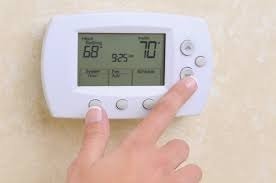What is the best temperature for a heater in winter?

As winter approaches, the cold weather can make it difficult to decide on the right temperature for your home’s heater. From wanting to save money and stay cozy, you want to find the most effective way of heating your home without spending more than necessary.
When searching for comfort while also trying to save some cash during a time where temperatures can dip well below freezing, deciding how warm is too warm may become a looming question.
In this post, we will discuss what is the best temperature for a heater in winter and provide tips that could help you save energy and money this season.
Need help with your heating? Check out this article.
Table of Contents
Different types of heaters and their ideal temperatures
The type of heater you have in your home is a major factor when it comes to deciding on the right temperature for winter. The suggested temperatures will vary depending on which heating system you are using.
Gas heaters typically run most efficiently at temperatures between 65 and 68 degrees Fahrenheit, while electric furnaces tend to be more effective at higher temperatures, around 70-72 degrees Fahrenheit.
Wood or pellet stoves are commonly used in colder climate areas and should be kept at a temperature range of 60-65 degrees Fahrenheit to avoid overworking the unit and burning too much fuel.
Using a programmable thermostat can help you maintain the best temperature for your heater while also reducing energy costs. This device allows you to set a schedule for different temperatures throughout the day, and it will regulate itself accordingly.
How to find the right heater for your home
When looking for a heater, you’ll want to consider the size of your home as well as its insulation. A larger home will require a larger heater and vice versa. Additionally, the amount of insulation in your home is important to consider when selecting a heater. If there isn’t proper insulation or if it has been damaged, the heat will escape quickly and cause your heater to overwork itself.
For homes that have an older heating system, you may want to consider upgrading or replacing it with a newer model that is more efficient and cost-effective. High-efficiency models can save up to 20% on energy bills every month compared to a standard one.
Lastly, when selecting a heater, you should also consider the environmental impact of the unit. Depending on where you live and the type of energy source you use, certain heaters are more sustainable than others.
Factors to consider when purchasing a heater
When purchasing a heater, there are many factors to consider. First and foremost, you should research the different types of heaters available and decide which type best meets your needs.
You will also want to factor in the size of your home, its insulation levels and climate zone when selecting the right model for you. Additionally, it is important to consider the energy efficiency ratings of potential heaters. Higher efficiency models tend to be more expensive, but they may save you money in the long run due to fewer monthly bills.
Consider also the environmental impact of your heater and what type of fuel source it uses. Different types of heaters can have different levels of emissions and energy output. Taking the time to research and compare models can help you make an informed decision about which heater is best for your home.
How to save money on your energy bills during the winter
Saving money on energy bills during the winter doesn’t have to be complicated. Here are three easy tips that could help you save energy and money:
1. Use a programmable thermostat: Programmable thermostats can reduce energy costs by regulating temperatures throughout the day, allowing you to set different temperatures for different times of the day. This will help you optimize energy usage and reduce your bills.
2. Insulate windows and doors: Installing insulation around your home’s windows and doors can help prevent heat from escaping, allowing you to maintain a more consistent temperature indoors without wasting energy.
3. Use space heaters: If you’re only using one room or area of your home but want to maintain a comfortable temperature, try using a space heater. They use less energy than central heating systems and can be moved from one room to another as needed.
By following these simple tips, you can save money on energy bills this winter and keep your home warm and comfortable.
Conclusion
Having the right heater in your home is essential for keeping you comfortable during the winter months. With so many choices available, it can be difficult to know which one is best for you. By considering factors such as size, insulation levels and climate zone, as well as researching different types of heaters, you can select a model that meets your needs.
Additionally, simple steps such as using a programmable thermostat and adding insulation around windows and doors can help you save energy and money on your monthly bills. Taking the time to research your options and make an informed decision can help ensure that you have the most efficient and cost-effective heater for your home.









